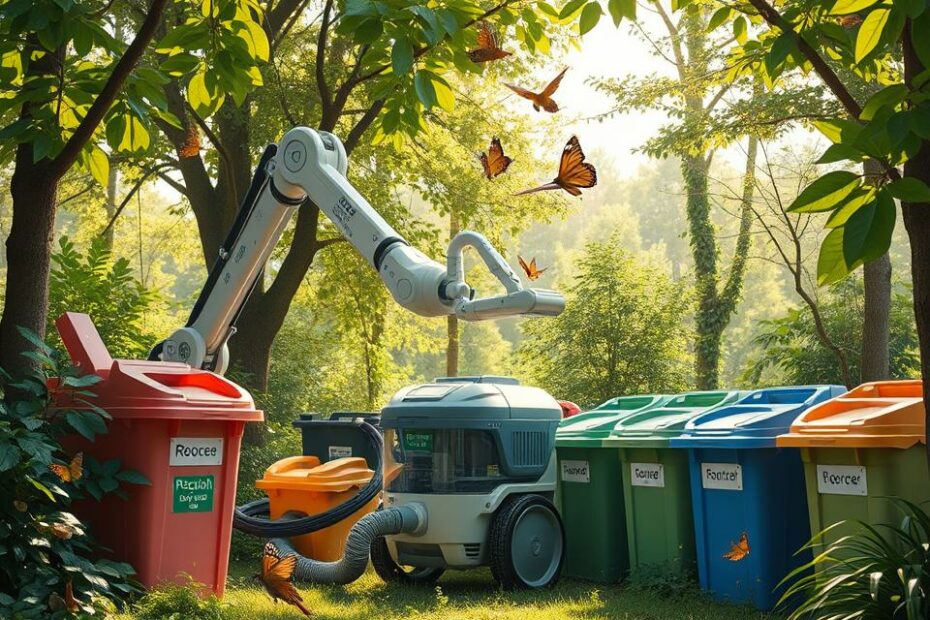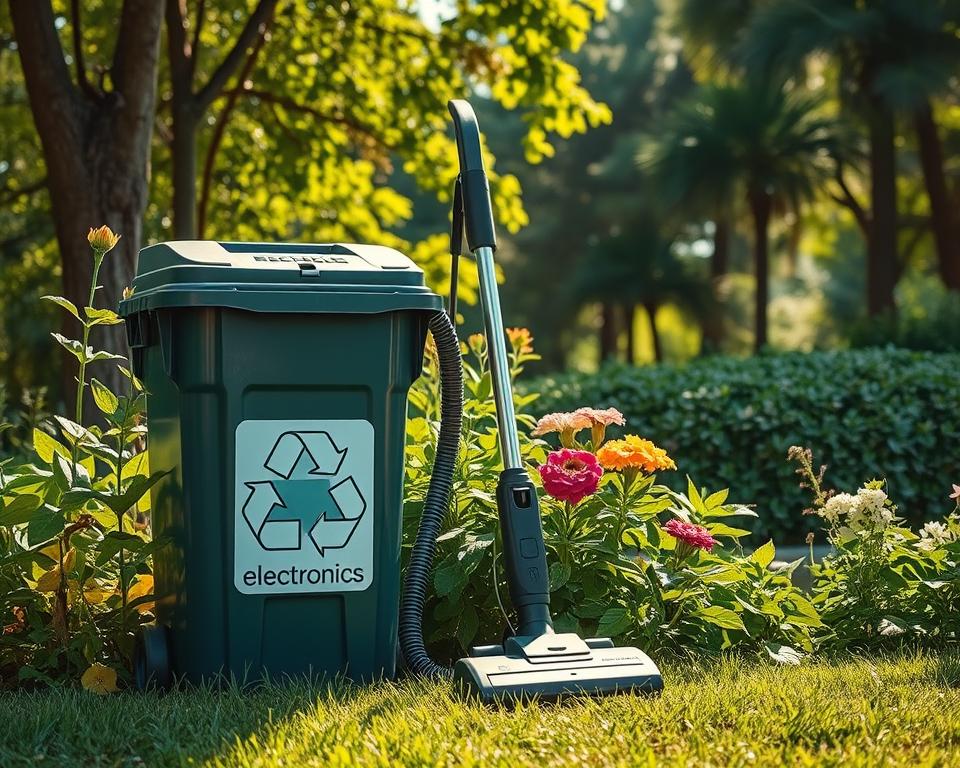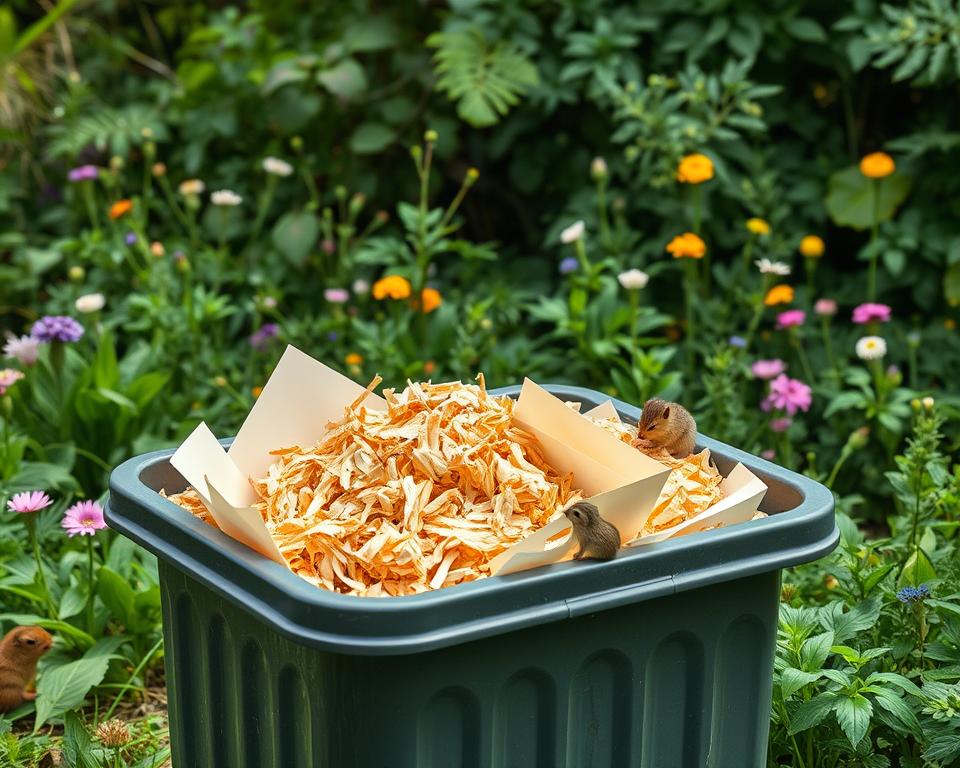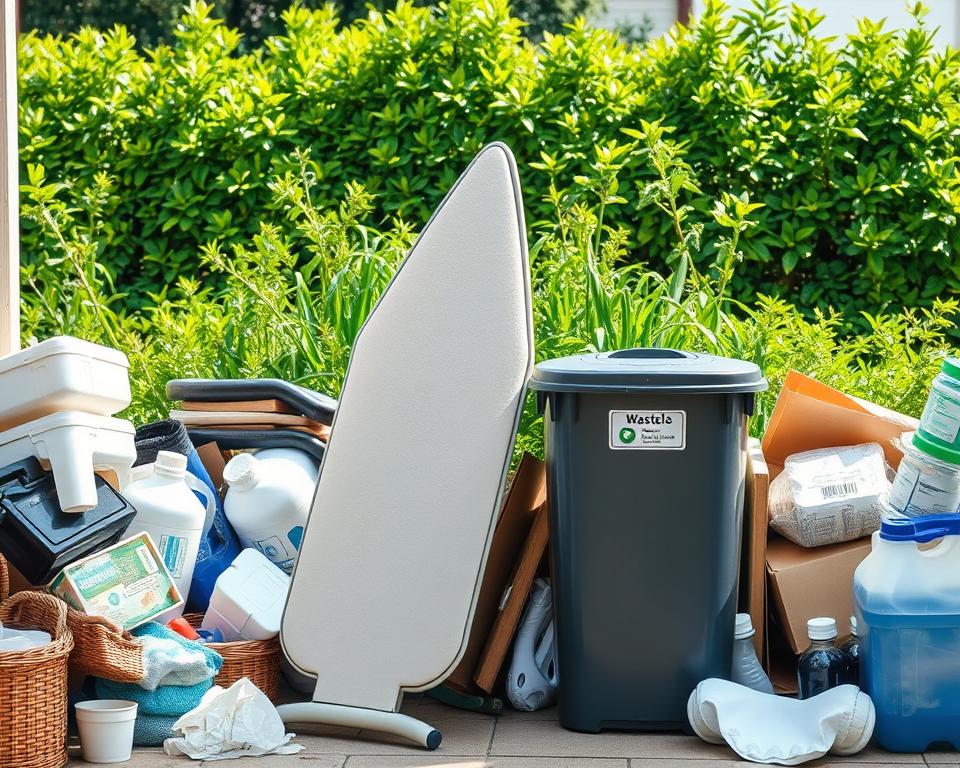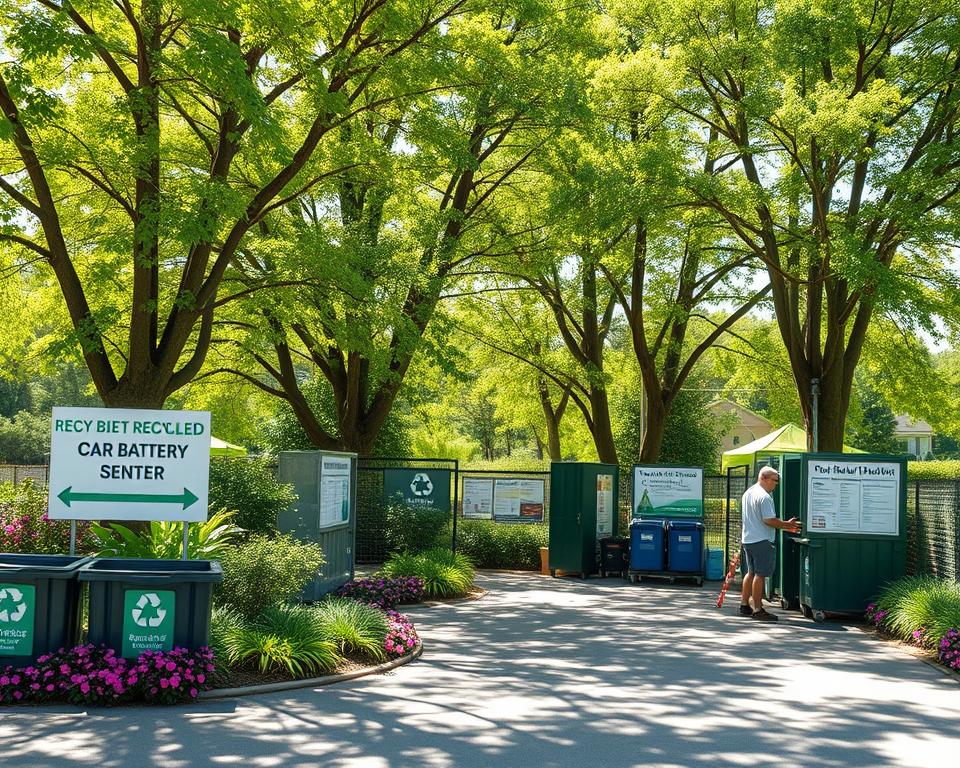Did you know that about 90% of vacuum cleaners can be recycled? This is because they are made of metal and plastic. As people learn more about the harm of electronic waste, it’s key to dispose of items like vacuum cleaners the right way. In places like California, throwing away a vacuum can even be against the law.
This guide will give you important tips and options for recycling vacuum cleaners. You can also donate working vacuums or follow other eco-friendly practices. By doing this, you help reduce waste and save resources.
Key Takeaways
- 90% of vacuum cleaners are recyclable due to their materials.
- Disposing of vacuums in the trash is illegal in some regions.
- Donating or selling functional vacuums can reduce waste.
- Local recycling centers can handle e-waste, including vacuum cleaners.
- Proper disposal protects the environment and ensures compliance with regulations.
The Importance of Eco-Friendly Disposal
As we learn more about waste’s impact, eco-friendly disposal becomes key. Vacuum cleaners, as electronic waste, can harm the environment. Proper disposal helps reduce these risks and supports sustainable living.
Recent surveys show a big change in how people act. About 64% of people want to recycle their old vacuum cleaners. This shows more people understand the need for eco-friendly options. Also, 42% of those who got rid of their vacuums last year used recycling programs, showing a rise in responsible actions.
It’s found that 78% of vacuum cleaners sent to recycling centers are broken down for parts. This shows how important it is to reuse devices. Local waste facilities have seen a 23% rise in people asking about how to dispose of vacuums properly. This shows a growing desire to help manage waste.
The U.S. alone produces about 6.9 million tons of e-waste each year. Improper disposal can pollute the environment and lead to big fines. Following the rules helps keep everyone safe and reduces waste. This is crucial for taking care of our planet.
| Factor | Percentage |
|---|---|
| Willing to recycle faulty vacuum cleaners | 64% |
| Utilized manufacturer recycling programs | 42% |
| Vacuum cleaners dismantled for parts reuse | 78% |
| Increase in inquiries about proper disposal | 23% |
Choosing eco-friendly disposal helps protect our planet for future generations. Encouraging people to act responsibly is key. Every effort we make towards sustainability matters.
Understanding Electronic Waste
It’s key to know what electronic waste is. It includes old devices like vacuum cleaners. These items have metals, plastics, and more. About 90% of a vacuum can be recycled.
Throwing away electronic waste harms our landfills. In the U.S., e-waste is growing fast. By 2030, it’s expected to reach 74.7 million metric tons. This shows we’re buying and throwing away more electronic stuff.
The Environmental Protection Agency (EPA) is working hard. They have programs like Plug-In To eCycling. This helps us recycle old appliances. You can take your old devices to stores or special recycling centers.
But, dealing with e-waste is tricky. Some items have harmful materials like mercury. This makes it harder to get rid of them right.
Getting to know electronic waste is important. It helps us make better choices. We can learn how to dispose of things in a way that’s good for our planet.
| Statistic | Data |
|---|---|
| Projected Global E-Waste by 2030 | 74.7 million metric tons |
| Percentage of E-Waste Recycled (2019) | 17.4% |
| Fastest-Growing Waste Stream | E-Waste |
| E-Waste Contribution to Municipal Solid Waste | Over 5% |
How to Decide When to Say Goodbye to Your Old Vacuum
Deciding when to get rid of your vacuum isn’t just about its age. You also need to check if it’s still working well. If your vacuum breaks down a lot or doesn’t clean as it should, it might be time for a new one. Signs like losing suction power or making too much noise are clear warnings.
Many vacuums today use old technology that doesn’t cut it anymore. If your vacuum doesn’t have features like good allergen capture, it’s time for a change. Even regular cleaning can’t fix problems like clogs that keep coming back.
When thinking about replacing your vacuum, remember that a good one keeps suction power steady. Look out for these signs that your vacuum is failing:
- Weak suction or visible blockages in the hose
- Frequent need for repairs
- Inadequate cleaning ability on various surfaces
- Outdated technology lacking modern features
Keep an eye out for these signs. Choosing a new vacuum that works well can make your home cleaner and healthier.
Steps to Dispose of Vacuum Cleaner Responsibly
Getting rid of an old vacuum cleaner needs careful thought. First, check if it still works. If it does, giving it to local charities or thrift stores is a good choice. These places can use it and help others.
If the vacuum is broken, look for recycling options. Check with local recycling centers to see if they take small appliances. For example, Minnesota and Davis have special programs for vacuum recycling. Dyson also has a recycling service for their products.
Another idea is to contact local repair shops. They might take broken vacuums for parts. This way, they can fix other vacuums and help the environment. You can also list broken vacuums on eBay. People often look for parts or DIY projects there.
Here’s a summary of the disposal options:
| Disposal Method | Description |
|---|---|
| Donation | Consider local charities and thrift stores that accept working vacuums. |
| Recycling Centers | Check for local programs, such as those in Minnesota and Davis. |
| Manufacturer Programs | Dyson offers a recycling service for old vacuums. |
| Repair Shops | Local shops may take broken vacuums for spare parts. |
| Online Marketplaces | Platforms like eBay can help sell non-functional vacuums. |
By taking these steps, you help reduce waste and support the environment. Planning how to dispose of your vacuum cleaner responsibly makes a big difference. It ensures that appliances are reused instead of thrown away.
Recycling Vacuum Cleaners: What You Need to Know
Recycling vacuum cleaners is a great way to cut down on waste and help the planet. About 90% of a vacuum can be recycled. This means we can turn it into things like outdoor furniture, car parts, and even plant pots.
Knowing how to get rid of your vacuum right is key. It helps make the most of recycling.
Finding a Local Recycling Center
To recycle your vacuum, find a local recycling center or e-waste facility. These places can take your vacuum and tell you how to dispose of it. Make sure they accept vacuum cleaners before you go.
A local recycling center can handle different materials well. They make sure metals and plastics are recycled right.
Breaking Down Your Vacuum for Recycling
Breaking down your vacuum helps a lot with recycling. It makes it easier to recycle and ensures materials are sorted right. Here’s what to do:
- Plastics: Separate plastic parts, as they can be made into new things.
- Metals: Take out metal parts for proper recycling.
- Electronic Components: Handle electronics carefully, as they might have harmful materials.
Understanding how to recycle your vacuum is important. It helps recycle materials well and keeps them in use longer.
Donation Options for Functional Vacuums
Donating vacuum cleaners is a great way to give old appliances a new life. Charities and organizations help by giving these items to those in need. They make sure everyone has what they need, helping the environment too.
Charities and Organizations That Accept Donations
Many charities take vacuum donations. Think about contacting local shelters, schools, and non-profits. They really appreciate getting vacuums that still work. It helps families and is good for the planet.
Online Marketplaces for Selling Used Appliances
Or, you could sell your vacuum online. Sites like Craigslist, eBay, and Facebook Marketplace make it easy to find buyers. Selling your vacuum can make you some money and help the environment by reducing waste. Just be honest about the vacuum’s condition.
| Option | Description | Benefits |
|---|---|---|
| Donation | Giving your old vacuum to charities or organizations | Supports those in need, promotes sustainability |
| Online Sales | Selling on platforms like eBay or Craigslist | Generates income, reduces waste |
| Recycling | Sending the vacuum to a dedicated recycling program | Minimizes environmental impact, saves energy |
Community Recycling Events and Programs
Many communities hold regular recycling events for electronic waste, like vacuum cleaners. These events offer safe ways to dispose of waste without cost. For example, Orange County Utilities lets people drop off hazardous waste and electronics at special events or locations.
Joining these events helps local sustainability efforts and ensures safe disposal of hazardous materials. People can get rid of items like rechargeable batteries and old computers. These programs protect both the community and the environment.
It’s important for residents to know about local recycling events, including when they are and what can be brought. Taking part in these events helps everyone dispose of waste responsibly. It also builds community bonds and makes a difference in our surroundings.
Properly Disposing of Hazardous Components
When getting rid of vacuum cleaners, we must focus on their hazardous parts. Batteries and toxic materials can be dangerous if not disposed of right. Knowing local rules and best practices for handling hazardous waste is key to keeping our environment and health safe.
Battery Disposal Regulations
Battery disposal in vacuum cleaners has its own rules because of the risk of toxic leaks. It’s important to check local regulations for safe disposal. Many places require dropping off batteries at recycling stations to follow hazardous waste management rules.
Stores like AutoZone and Best Buy make recycling batteries easy. This helps users get rid of old batteries in a responsible way.
Handling Toxic Chemicals in Electronics
Vacuum cleaners have electronic parts with toxic chemicals. It’s crucial to handle these safely to avoid pollution. Following the Universal Waste Rule helps ensure safe disposal of hazardous e-waste.
If you’re not sure how to dispose of these items, ask local waste management for advice. Using facilities that handle toxic chemicals properly can greatly reduce harm to the environment.
The Role of Manufacturers and Retailers in Recycling
Manufacturers and retailers are key in promoting recycling. They have programs to recycle old appliances. This helps reduce the 6.9 million tons of electronic waste in the U.S. each year.
Retailers are also getting involved. For example, Best Buy lets customers recycle used appliances. This teamwork encourages people to recycle instead of throwing away vacuum cleaners.
These efforts make a big difference. Almost 90% of vacuum cleaners can be recycled, but only 30% are. Recycling helps the economy too, creating about 250,000 jobs in the U.S. each year.
| Initiative Type | Description | Benefits |
|---|---|---|
| Manufacturers Recycling Programs | Programs set up by manufacturers to facilitate the return and recycling of old products. | Promotes sustainable disposal and reduces e-waste. |
| Retailer Disposal Initiatives | Initiatives by retailers allowing customers to bring back used appliances for recycling. | Encourages responsible recycling and supports local communities. |
| Economic Impact | Jobs generated and revenue from recycling efforts. | $62 billion contribution to the economy and job creation. |
In summary, manufacturers and retailers are crucial in recycling efforts. Their programs help reduce electronic waste and make our environment cleaner for the future.
Conclusion
Using eco-friendly ways to get rid of old vacuum cleaners is key to keeping our planet safe. Knowing the different ways to dispose of them helps us make smart choices. We can recycle through local programs or donate to charities.
Many families want to do their part for the environment. Companies like Dyson and Bosch help by recycling old appliances. Stores like Currys and John Lewis make it easy to return old vacuums. These actions help save resources and make our planet healthier for the future.
Every choice we make matters, whether it’s fixing, recycling, or donating. By choosing these options, we help create a better world. We set a good example for others, inspiring them to care for our planet too.
FAQ
What is the best way to dispose of my old vacuum cleaner?
To dispose of an old vacuum cleaner, consider recycling at local e-waste facilities. If it still works, donate it. Check with manufacturers for take-back programs. This approach helps the environment and reduces waste.
Why is eco-friendly disposal important?
Eco-friendly disposal is key because it keeps harmful materials out of the environment. It also cuts down on landfill pollution and supports sustainable practices. Proper disposal helps our planet and reduces the harm caused by electronic waste.
Can I recycle my vacuum cleaner?
Yes, you can recycle your vacuum cleaner. Most recycling centers accept them and break them down. Always call ahead to confirm they take vacuums and to learn about their recycling process.
What components of a vacuum cleaner are recyclable?
About 90% of a vacuum cleaner can be recycled. This includes metals, plastics, and electronic parts. By taking it apart, you can recycle these materials, helping to reuse resources.
How do I know when it’s time to replace my vacuum cleaner?
It’s time to replace your vacuum if it breaks down often, loses suction, or makes too much noise. If it lacks important features, it’s also a sign. Check how well it works and if it has the latest technology.
Where can I donate my old vacuum cleaner?
You can donate your old vacuum to local charities, shelters, schools, or non-profits. This helps those in need and keeps the appliance useful for longer.
Are there online platforms for selling used vacuum cleaners?
Yes, you can sell your used vacuum on sites like Craigslist, eBay, or Facebook Marketplace. Make sure to describe its condition honestly to support sustainable buying and selling.
What should I know about battery disposal in vacuum cleaners?
Batteries in vacuums have hazardous materials, so follow local rules for disposal. Check local guidelines to safely dispose of batteries and protect the environment.
How can manufacturers and retailers assist in the recycling process?
Many brands have recycling or take-back programs for old appliances. Companies like Best Buy let customers return used vacuums. This supports recycling efforts in our communities.
